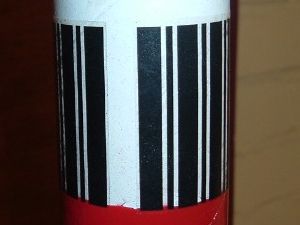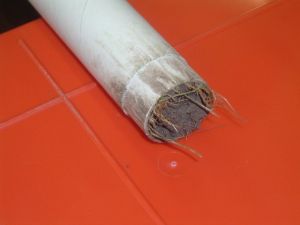| Construction Rating: | starstarstarstar_borderstar_border |
| Flight Rating: | starstarstarstar_borderstar_border |
| Overall Rating: | starstarstarstar_borderstar_border |
| Manufacturer: | Das Modell  |

Brief:
A three fin long rocket with a transition from 40 to 25mm. Designed for the
German market, it uses a non standard motor mount and body tubes. 500mm
parachute recovery.
Construction:
The kit consists of:
- Three cardboard fins
- Vacuum formed transition
- Three 40mm diameter body tubes
- Two 25mm body tubes
- 25mm nose cone
- Engine hook
- 25mm engine mount
- Centering rings
- Elastic cord
- 500mm parachute sheet (bin bag quality)
- Parachute cotton
- Two launch lugs
- Waterslide transfer decals
- Wadding (dog barf)
- Instructions in German
The quality of the kit is relatively poor. This is especially true for the transition which is a very thin vacuum formed affair. The transition itself can easily be squashed by light finger pressure. The body tubes are study but have deep spirals which will require a lot of finishing. The fins are made of some sort of composite cardboard, which is reasonably firm but the edges are rough and little can be done to sand the leading edges. I used these for my rocket, although I would use these as a template for balsa fins next time.
The instructions are in German and appear to be generic for several rockets as there are motor mount configurations for 3 different size motors, although only one motor mount tube is supplied. The instructions also show a four fin model whereas this is three finned rocket. However, the model is a straight forward affair and provided you have built one or two rockets before the instructions are okay.
The motor mount tube supplied is longer that the one in the instructions, therefore do not measure the slit for the engine hook from the back as suggested. Otherwise the hook will not fit. After I had built the model, I found the 24mm D motor to wobble around very loosely. Although I did not check this before, if I was to build the rocket again I would either use a 24mm mount or glue a 24mm mount inside of the 25mm mount.
The transition has to be cut out of the vacuum formed sheet. Part of the transition acts as a coupler to the top part of the rocket. This coupler is quite shallow so you have to take care in aligning the top half correctly.
The shock cord supplied is only 22 inches long, I swapped this for 3 meters of Kevlar® with a 1.0 meter long elastic shock tied onto the Kevlar®. The shock cord attachment is similar to the Estes paper system. Foolishly I followed the instructions and used them--don't do this (the first flight report will explain why). Later I replaced the paper mounts by epoxying snap swivels to the body tubes.
Swap the launch lugs. They are too small for a 5mm rod.
Finishing:
The tubes have very deep spirals in them. Even with two primer coats and 3-4
spray coats with rub downs in between, the grooves still show. In the end I
gave up and accepted that the grooves were to stay.
 The decals were
poor. The striped transfer that goes around the body tube was too short and the
other transfers were low quality.
The decals were
poor. The striped transfer that goes around the body tube was too short and the
other transfers were low quality.
After all that, she does not look that bad a rocket. At over six feet tall, she has pad presence for a D motor.
Construction Rating: 3 out of 5
Flight:
Recommended motor is a D7-3 which is a German motor and is impossible to
obtain. Physics of Flight, an English rocket vendor that is the sole vendor of
Das Modell rockets in England, recommended a D12-5. I disagree with this: a
D12-3 is the perfect motor choice.
I swapped the plastic parachute for a 24inch nylon parachute and attached it with a snap swivel to the top part of the shock cord.
I use Aramid cloth, a type of Nomex®, as a heat shield, using two 8 inch strips tied to the shock cord at the bottom. The body tubes are large so everything fits in neatly. The 24mm motor requires about four wraps of masking tape to fit the mount. SpaceCAD said that it will reach over 100 meters, although I think it went a tad higher.
First flight: 15 mph winds and 3 mm rod used. The rocket was naked, I did not wrap the motor up, and did not have any tape with me. The launch lugs supplied are too small for the 5mm rod that I fly D and E motors on, so I foolishly used a 4 foot long 3mm rod.
This is a heavy, long rocket and the 3mm rod bent at a 20-30 degree angle from the normal. A sensible member of my club suggested we leave it for another day. The rest of us ignored this sound advice and launched anyway.
 It was a
straight flight off the pad and then weathercocked to a near horizontal path.
She was traveling at speed when deployment occurred. The deceleration was too
much for the paper mounts and the bottom mount ripped free. The top half
recovered very well on the parachute with the bottom half giving the club the
best core sample that it has ever seen. There was a small char on the
parachute.
It was a
straight flight off the pad and then weathercocked to a near horizontal path.
She was traveling at speed when deployment occurred. The deceleration was too
much for the paper mounts and the bottom mount ripped free. The top half
recovered very well on the parachute with the bottom half giving the club the
best core sample that it has ever seen. There was a small char on the
parachute.
Second flight: 5 mph winds and 4 mm rod used. After repairs and a paint job, she was now prepped with a fully wrapped motor, three lengths of Aramid and the shock cord mounts fully upgraded. The rocket also now splits in between tube lengths and not at the transition like most rockets. I stupidly packed the parachute in the top part of the rocket with the wadding and cord it the bottom half.
The flight was perfect: straight up, pure, and true. Ejection was right at apogee but the parachute did not deploy. Fortunately the rocket landed in a tree (it's not often you hear that). On retrieving there was very little damage, mainly scratches to the paintwork and a small puncture to the lover body tube from a thorn.
Third flight: 5 mph winds and 4 mm rod used. Third time was the charm. After a refinishing she was prepped to fly. Parachute in the lower half this time. Flight was as before exactly: no parachute deployment and she hit the ground sideways and hard. A coupler split, but no damage to the tubes. A fin was ripped off cleanly too. On inspection at home, the fin and its fillets had remained intact. It was the paper tube that had come apart--poor quality tubes. The ejection charge had pushed the parachute up into the top section where it got stuck.
Fourth flight: 10 mph winds and 4 mm rod used. After repairs and a paint touch up, I retrofitted a spare motor mount ring to the top half of the body tube. This was to stop the parachute from hiding in there. This time the flight was straight and true with ejection at apogee, perfect deployment of parachute, and the rocket calmly drifted onto the sports hall roof 400 meters away. It was recovered later that day and there was a lot of damage, but this was from dragging the rocket across a roof with a 10 meter pole. She is repaired now.
Recovery:
PROs:
- Recovery is at a slow to steady rate with a 24 inch parachute. You could use a 18 inch parachute.
CONs:
- The shock cord needs upgrading.
- The parachute needs upgrading.
- The shock cord mount needs upgrading.
- The upper section of the lower body tubes needs a bulk head fitting.
- This was not a well thought out kit.
Flight Rating: 3 out of 5
Summary:
Despite the quality of the components and the flaw in the recovery system, this
rocket actually flies well and looks good in the air. I would be tempted to
clone the kit with better quality tubes and mount.
Overall Rating: 3 out of 5
 |
 |
Flights
 |
 |
Sponsored Ads
 |
 |



![Das Modell [Single-CD] Das Modell [Single-CD]](https://m.media-amazon.com/images/I/51QkvXl8hQL._SL500_.jpg)
![Das Modell [Single-CD] Das Modell [Single-CD]](https://m.media-amazon.com/images/I/41kV5zGtxoL._SL500_.jpg)
![Das Modell [Single-CD] Das Modell [Single-CD]](https://m.media-amazon.com/images/I/41qa4+2YypL._SL500_.jpg)






T.E. (February 17, 2008)